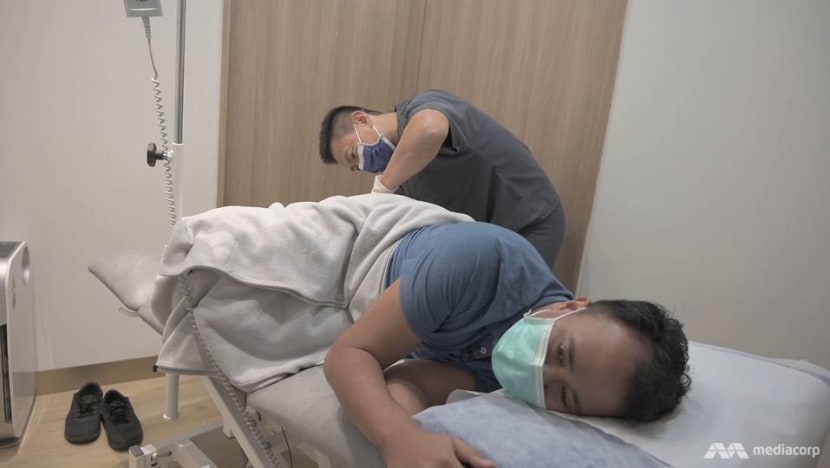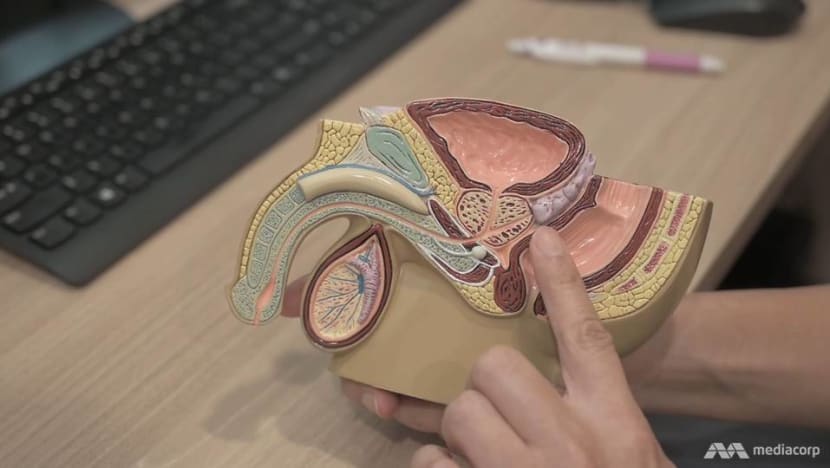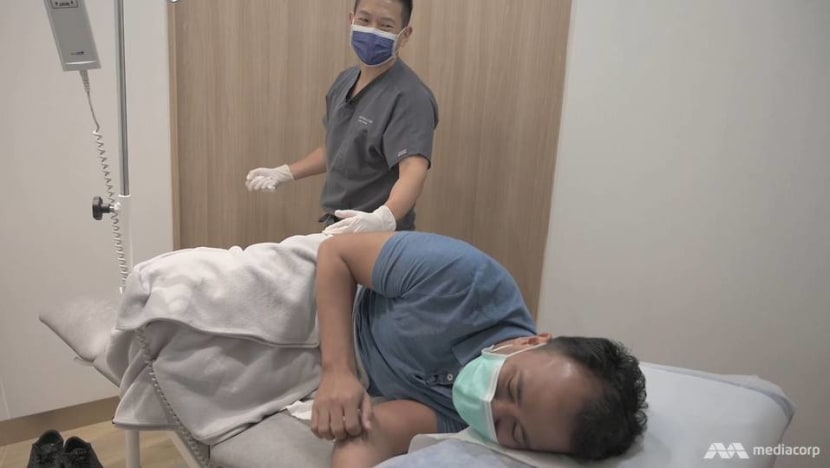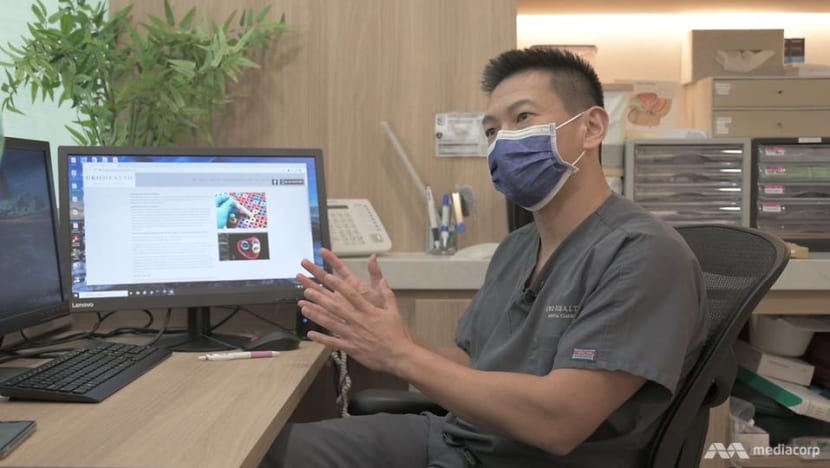Uncomfortable but painless: Rectal screening for prostate cancer is nothing to fear
With November being Prostate Cancer Awareness Month, CNA journalist Aqil Haziq Mahmud went through a rectal screening to demystify a simple test which some men are reluctant to take – but which can be effective in identifying signs of one of the most common types of cancer.

Dr Tan Yung Khan performing a digital rectal exam to check my prostate. (Photo: Marcus Mark Ramos)
SINGAPORE: A digital rectal exam is a quick and simple way of helping to check for signs of one of the most common cancers in Singapore.
And yet, the test for prostate cancer is more likely to be something that many men will make jokes about rather than going through with it – even though it could save their lives.
I included myself in the group more likely to nervously laugh about the test which, simply put, involves a doctor inserting a finger into one's rectum to feel the prostate gland. This is why I was somewhat taken aback when my editor suggested I go for the screening as I was working on a feature about prostate cancer.
His rationale? Experiencing what is involved and writing an article about it could help demystify the procedure – and encourage more men to have it done.
Prostate cancer is the third-most common cancer in Singaporean men, and November is Prostate Cancer Awareness Month. The No-Shave November – or Movember – movement also raises awareness for prostate and testicular cancers.
READ: Prostate cancer - Survivors talk radiation, loose bowels and battling a disease more common than you think
So on Tuesday (Nov 24), I went for a digital rectal exam to try to further this cause. A doctor would insert his finger into my rectum to feel for irregularities in my prostate, including in its texture and hardness. A rock hard or lumpy prostate could be signs of cancer.
A caveat: Prostate cancer usually affects men above the age of 50. This means that at 29, I am "really quite young" for there to be a risk of prostate cancer, said Urohealth Medical Clinic's Dr Tan Yung Khan, who would perform the exam on me.
"Usually I tell people above 50, definitely get screened for prostate cancer," said Dr Tan, a senior consultant in urology with about a decade of specialist experience. "Of course if you have a family history of cancer, I would start at 45 or even 40 years old."
The youngest patient with prostate cancer Dr Tan has seen was 35 years old, although he stressed that this was "very rare". The patient, who already had symptoms, was diagnosed with a rare and aggressive type of prostate cancer.

The symptoms of prostate cancer include difficulty urinating, frequent urination or blood in the urine, which Dr Tan said are similar to symptoms of an enlarged prostate that might not be cancerous.
But he highlighted that in 70 per cent of prostate cancer cases, symptoms can only be seen during the advanced stages.
"Usually if you have symptoms, it may be cancer related, but more likely it's going to be an enlargement of the prostate and not so much cancer," he added.
THE REALITIES OF THE TEST
With that said, Dr Tan reiterated that he would have "nothing to say" if he found anything wrong with my prostate. I laughed a little anxiously, trying to prolong the interview and delay the exam. Is the procedure painful? I asked.
Dr Tan said some patients are afraid of the exam, and so he needs to reassure them that it is not painful and will be over quickly.
"It's not painful, but I wouldn't say it's comfortable either," he continued, adding that he performs this test a couple of times a day, each taking about a minute at most.
"Certain circumstances may make it a little bit more uncomfortable. For example, if you have anal conditions like hemorrhoids or pulse, or anal stricture or fistula, a condition where the anus itself has tears in it."
This was a little comforting. My backside has generally felt fine over the years, even during rare bouts of painful diarrhoea. I decided it was time for the test. What little fear I had initially was certainly bubbling now.

Dr Tan got me to lie on my back with my pants and underwear pulled down to my knees. In an almost synchronous motion, he draped a blanket over my waist and legs.
Then he asked me to lie on my side, facing my left, with my knees tucked into my stomach, "like a baby". I duly obliged, but as a grown man and not a baby, I felt extremely vulnerable exposing my buttocks to an even older grown man.
Dr Tan snapped on a pair of latex gloves and squeezed a glob of lubricant on his right index finger, sounds that made my heart sink even further. "Just relax, okay?" he said. "Don't worry, you're doing really well."
My surgical mask concealed an expression that would have betrayed extreme worry, as I waited for any sort of searing pain. Somewhere in my head, a voice told me I deserved a promotion for taking on this assignment.
"I'll put a bit of pressure on your backside now," Dr Tan said. Then it came, a probing pinch. I winced and gasped, but the pinch quickly disappeared. The finger was in. "Sorry, sorry," Dr Tan said, as he shifted from a standing to a crouching position.
What followed was the most uncomfortable part of the test. The vague feeling of the finger moving induced a strange sensation of needing to poop. It was similar to sitting on a toilet bowel and feeling your bowels churn.

I voiced my concerns with Dr Tan, and he said it was normal. "Almost done," he assured. I held my breath for a bit. Thankfully, nothing came out. Soon, the finger slipped out. "All feels normal," Dr Tan added. "Great! Very well done."
HOW PROSTATE CANCER IS DIAGNOSED
Nevertheless, Dr Tan said prostate cancer screening does not only involve a digital rectal exam, but also a prostate-specific antigen (PSA) blood test. An elevated PSA level is another symptom of prostate cancer.
"If it is above four nanograms per millilitres, then we think that you've reached a point where we need to consider a risk of prostate cancer," he said. "And then we will go on to do more tests."
In the past, this would involve going for a biopsy, where a needle is used to remove tissue samples from the prostate. These samples would be examined under a microscope for cell abnormalities pointing to cancer.
"Hopefully, if there's a tumour, (the needle will) hit it," Dr Tan said. "But oftentimes, especially in a bigger prostate, we're going to miss the tumour."
This means that if the PSA level remained elevated, doctors would have to repeat the biopsy, each time with potential risks of bleeding or infection.

Current advancements like a prostate health index blood test or a multi-parametric MRI of the prostate can further pinpoint if the elevated PSA is really a sign of cancer or something else, Dr Tan said.
"If we find a cancer, it will look like an abnormal area on the MRI, and now with new technology, we can do something called a targeted biopsy where we can specifically target the area of abnormality," he added.
"So we can have more certainty that we haven't missed the cancer. It's way more accurate and way less repeated biopsies."
For those who would like to start screening for prostate cancer, Dr Tan said it would be good to have a family general practitioner who knows your condition and can arrange for a digital rectal exam or PSA blood test.
"I think that is the best first point of contact," he said. "If it's abnormal, then they can refer you on to a urologist for further evaluation."
I came out of the digital rectal exam a little psychologically bruised, but I felt it was worth the peace of mind knowing my prostate was in good condition.
It really is a straightforward test that should be on the to-do list for men above the age of 50, or younger if they have a family history of cancer.












